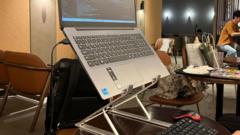In the bustling neighborhood of Daechi, Seoul, a growing trend has emerged as cafes transform into makeshift offices for students and professionals. Known as “Cagongjok”, this phenomenon sees young South Koreans settling in cafes for hours at a time, equipped with multiple electronic devices. One cafe owner, Hyun Sung-joo, recounted an incident where a customer commandeered a power outlet with two laptops and a six-port power strip, prompting him to block access to the outlets.
The challenge of accommodating Cagongjok is acutely felt in a city where rents are steep, leaving cafe owners grappling with the balance between customer satisfaction and sustainability. Starbucks Korea recently announced nationwide guidelines to curb extreme cases of cafe monopolization. Though to date no customers have been evicted, staff are now encouraged to offer guidance to maintain a more enjoyable environment for all patrons, particularly amidst reports of theft from unattended belongings.
Despite the new rules, cafes remain popular study hotspots. For instance, an 18-year-old preparing for the rigorous university entrance exam, “Suneung”, shared that her long hours at Starbucks provide a welcome refuge from her crowded home. However, customers and staff have noticed minimal alterations in behavior since the guidelines were enacted, indicating the challenge of enforcing the new policies.
The varied responses to Starbucks' initiatives reflect broader societal attitudes towards Cagongjok. While many patrons appreciate measures intended to preserve the social atmosphere of the cafe, others have criticized the decision as an overreach. This cultural shift towards cafe studying has been escalating since 2010, spurred by the expansion of coffee chains across South Korea, with nearly 100,000 cafes now operating in the country.
Employing different strategies, independent cafes are finding their own ways to adapt, ranging from relaxed attitudes to stricter time restrictions. A Jeonju cafe owner revealed that he implemented a “No Study Zone” policy after receiving frequent complaints from patrons seeking a space for conversation. The owner noted that some customers were taking over tables for hours without leaving, prompting the need for guidelines ensuring fair usage of communal space.
The question remains: Why do so many South Koreans prefer cafes for studying over libraries or home? For some like Yu-jin Mo, a 29-year-old woman raised in foster care, cafes represent a safer, more pleasant environment than libraries, which can feel intimidating. Her experience highlights a larger sentiment among many young people who perceive cafes as more comforting spaces amid the intense pressures of academic and social life.
Professor Choi Ra-young, who has researched the culture of lifelong education, attributes this phenomenon to South Korea's competitive atmosphere, arguing that the existence of Cagongjok underscores a lack of adequate public study spaces. She advocates for a balance where both studying and socializing can coexist in cafes, suggesting that guidelines could help meld these cultures in a manner that respects everyone's needs.
With increasing numbers of job-seeking youth and students feeling overlooked, the rise of Cagongjok will likely continue, presenting ongoing challenges for coffee shops to navigate as they strive to create inclusive environments for all.

















